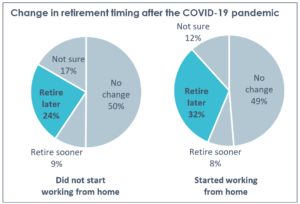Impacts of Working Remotely Due to the Pandemic
Insights from Greenwald Research’s Rethinking Retirement Study
AnnMarie Pino
Before the pandemic, just 9% of workers primarily worked from home. By the time Greenwald Research’s Rethinking Retirement Study was fielded in early December, this share jumped to 32%. For those who faced this significant shift in work environments caused by the COVID-19 pandemic, there are many questions on what the impacts are—both short- and long-term.
53% of workers age 55–69 report that since the pandemic begun, their employer has allowed for flexible work arrangements, likely born out of necessity due to local guidelines and mandates. Employees say the pandemic has changed how their employer conducts day-to-day business, with those now working from home more likely to say this has been impacted to a great extent (43% vs. 33% not working from home).
Job Satisfaction
Despite these major changes brought about by the pandemic, more than three-quarters of workers are satisfied with their job. Those whose job shifted to working from home are no different, with 77% reporting they are satisfied. However, more of those now working at home saw an increase in job satisfaction since the pandemic’s onset—34% are now more satisfied with their jobs compared to the 22% of workers who are not now working remotely.
Even if Zoom fatigue is real (75% of remote workers say they have at least a few virtual meetings a week), it seems that the move away from the office has boosted job satisfaction for many.

Retirement Timing
One of the biggest questions from this study is how the pandemic is impacting what retirement looks like. For current employees, 42% say the pandemic has not changed when they plan to retire. However, 32% of those who shifted to remote work say they are now planning to retire later than originally planned (vs. 24% of those who did not switch to working from home).

In addition, the motivations around the decision to delay retirement are different depending on if employees started working at home only after the pandemic began. For instance, the financial impact of the pandemic is the top reason those who did not transition to working from home say they will continue to work longer (41% vs. 27% working remotely). While these employees are planning to work longer out of financial necessity, those who did start working from home attributed this ability to work remotely as the top reason to delay retirement (29% vs. 11% of those not working remotely post-pandemic).
Going Forward
Satisfaction with how employers have handled the pandemic is high, but it is equally important for employers to consider how they will proceed as the world moves beyond widespread stay-at-home orders. Continued flexibility is key to ensure that these employees continue to remain satisfied but also to accommodate those who may not have enjoyed the change in work environments. One solution will not fit all, so continuing to adapt and create arrangements to best suit individual employees’ needs can help drive job satisfaction, leading to higher productivity and lower employee turnover.

Click here to learn more about Greenwald Research’s Rethinking Retirement Study or to purchase the full study results.








